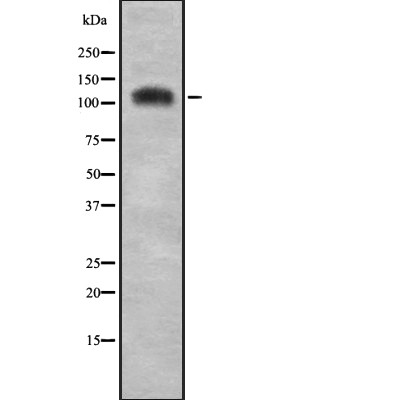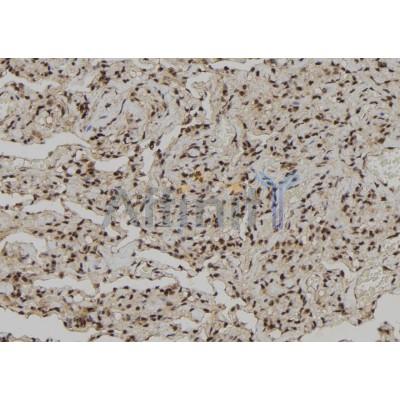C/EBP zeta Antibody - #AF9028
(2)
| Product: | C/EBP zeta Antibody |
| Catalog: | AF9028 |
| Description: | Rabbit polyclonal antibody to C/EBP zeta |
| Application: | WB IHC IF/ICC |
| Reactivity: | Human |
| Mol.Wt.: | 120kDa; 121kD(Calculated). |
| Uniprot: | Q03701 |
| RRID: | AB_2843219 |
Product Info
Source:
Rabbit
Application:
WB 1:1000, IHC 1:50-1:200, IF/ICC 1:100-1:500
*The optimal dilutions should be determined by the end user. For optimal experimental results, antibody reuse is not recommended.
*Tips:
*The optimal dilutions should be determined by the end user. For optimal experimental results, antibody reuse is not recommended.
*Tips:
WB: For western blot detection of denatured protein samples. IHC: For immunohistochemical detection of paraffin sections (IHC-p) or frozen sections (IHC-f) of tissue samples. IF/ICC: For immunofluorescence detection of cell samples. ELISA(peptide): For ELISA detection of antigenic peptide.
Reactivity:
Human
Clonality:
Polyclonal
Specificity:
C/EBP zeta Antibody detects endogenous levels of total C/EBP zeta.
RRID:
AB_2843219
Cite Format: Affinity Biosciences Cat# AF9028, RRID:AB_2843219.
Cite Format: Affinity Biosciences Cat# AF9028, RRID:AB_2843219.
Conjugate:
Unconjugated.
Purification:
The antiserum was purified by peptide affinity chromatography using SulfoLink™ Coupling Resin (Thermo Fisher Scientific).
Storage:
Rabbit IgG in phosphate buffered saline , pH 7.4, 150mM NaCl, 0.02% sodium azide and 50% glycerol. Store at -20 °C. Stable for 12 months from date of receipt.
Alias:
Fold/Unfold
CBF; CBF2; CCAAT binding factor; CCAAT box binding transcription factor; CCAAT-binding factor; CCAAT-box-binding transcription factor; CCAAT/enhancer binding protein zeta; CCAAT/enhancer-binding protein zeta; CEBPZ; CEBPZ_HUMAN; HSPCBF;
Immunogens
Immunogen:
A synthesized peptide derived from human C/EBP zeta, corresponding to a region within N-terminal amino acids.
Uniprot:
Gene(ID):
Sequence:
- Q03701 CEBPZ_HUMAN:
- Protein BLAST With
- NCBI/
- ExPASy/
- Uniprot
MAAVKEPLEFHAKRPWRPEEAVEDPDEEDEDNTSEAENGFSLEEVLRLGGTKQDYLMLATLDENEEVIDGGKKGAIDDLQQGELEAFIQNLNLAKYTKASLVEEDEPAEKENSSKKEVKIPKINNKNTAESQRTSVNKVKNKNRPEPHSDENGSTTPKVKKDKQNIFEFFERQTLLLRPGGKWYDLEYSNEYSLKPQPQDVVSKYKTLAQKLYQHEINLFKSKTNSQKGASSTWMKAIVSSGTLGDRMAAMILLIQDDAVHTLQFVETLVNLVKKKGSKQQCLMALDTFKELLITDLLPDNRKLRIFSQRPFDKLEQLSSGNKDSRDRRLILWYFEHQLKHLVAEFVQVLETLSHDTLVTTKTRALTVAHELLCNKPEEEKALLVQVVNKLGDPQNRIATKASHLLETLLCKHPNMKGVVSGEVERLLFRSNISSKAQYYAICFLNQMALSHEESELANKLITVYFCFFRTCVKKKDVESKMLSALLTGVNRAYPYSQTGDDKVREQIDTLFKVLHIVNFNTSVQALMLLFQVMNSQQTISDRYYTALYRKMLDPGLMTCSKQAMFLNLVYKSLKADIVLRRVKAFVKRLLQVTCQQMPPFICGALYLVSEILKAKPGLRSQLDDHPESDDEENFIDANDDEDMEKFTDADKETEIVKKLETEETVPETDVETKKPEVASWVHFDNLKGGKQLNKYDPFSRNPLFCGAENTSLWELKKLSVHFHPSVALFAKTILQGNYIQYSGDPLQDFTLMRFLDRFVYRNPKPHKGKENTDSVVMQPKRKHFIKDIRHLPVNSKEFLAKEESQIPVDEVFFHRYYKKVAVKEKQKRDADEESIEDVDDEEFEELIDTFEDDNCFSSGKDDMDFAGNVKKRTKGAKDNTLDEDSEGSDDELGNLDDDEVSLGSMDDEEFAEVDEDGGTFMDVLDDESESVPELEVHSKVSTKKSKRKGTDDFDFAGSFQGPRKKKRNLNDSSLFVSAEEFGHLLDENMGSKFDNIGMNAMANKDNASLKQLRWEAERDDWLHNRDAKSIIKKKKHFKKKRIKTTQKTKKQRK
Research Backgrounds
Function:
Stimulates transcription from the HSP70 promoter.
Subcellular Location:
Nucleus.
Family&Domains:
Belongs to the CBF/MAK21 family.
Restrictive clause
Affinity Biosciences tests all products strictly. Citations are provided as a resource for additional applications that have not been validated by Affinity Biosciences. Please choose the appropriate format for each application and consult Materials and Methods sections for additional details about the use of any product in these publications.
For Research Use Only.
Not for use in diagnostic or therapeutic procedures. Not for resale. Not for distribution without written consent. Affinity Biosciences will not be held responsible for patent infringement or other violations that may occur with the use of our products. Affinity Biosciences, Affinity Biosciences Logo and all other trademarks are the property of Affinity Biosciences LTD.

